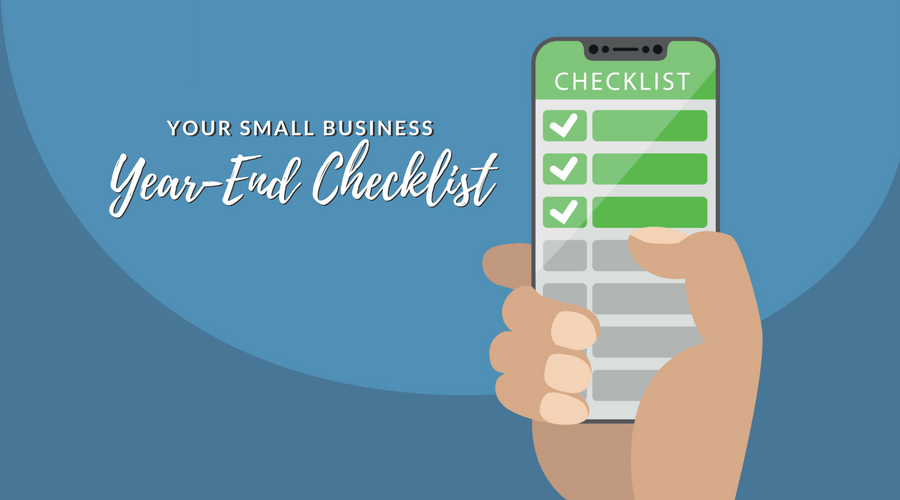Your Small Business Year-End Checklist [Free Download]

The end of the year is the perfect time for your small business to wrap up projects and get everything ready for the new year. Use this year-end checklist to complete necessary tasks and prepare for the upcoming year.
1. Remind your employees to review their W-4s
Your team members can update their W-4s whenever they want, but the end of the year is a great time to review them. Remind your staff to verify that the information is correct and the amount they want to be withheld is accurate.
2. Verify workers’ names and SSNs
The Social Security Administration offers an easy way for you to verify your employees’ Social Security numbers (SSN) online. Doublecheck that your workers’ names and SSNs match so you don’t run into problems when you’re filing their W-2s.
3. Gather W-2 information
W-2s are due by January 31 each year, so start gathering everything you need now, so you’re not rushed later. Every form will require your Employer Identification Number (EIN), company name, address, ZIP code, and your company’s state taxpayer identification number (TIN).
For each staff member, you’ll need:
- employee’s name
- SSN
- total wages, tips, and other compensation paid
- federal income tax withheld
- Social Security wages and tips earned
- Social Security withheld
- Medicare wages and tips earned
- Medicare withheld
- allocated tips paid
- taxable benefits
- state wages and tips
- state income tax withheld
- local wages and tips paid
- local taxes withheld
Read also: Tax Basics: Form W-2
4. Hold year-end performance reviews
The end of the year is a great time to hold performance reviews with each worker. You can talk about your team members’ accomplishments during the past year and set goals for the upcoming year.
5. Hand out bonuses
If you’re going to hand out bonuses, the end of the year is a great time to do it. You’ll receive a tax deduction, and you’ll boost your staff’s morale.
Read also: Are You Giving Your Employees Bonuses? Check Out the Tax Implications
6. Request contractors’ TINs
If you’ve hired any independent contractors during the year, make sure you have their TINs, which you can request using Form W-9. This will allow the IRS to match any 1099s you file with your contractors’ tax returns.
7. Get your books in order
Before the end of the year, make sure that all income and expenses are accounted for. If you need help, hire a bookkeeper or accountant.
8. Examine financial documents
After you’ve gotten your books in order, analyze your financial standing to ensure your business is in good shape.
- Your balance sheet is a summary of how your business is doing at a particular point in time and shows your assets, liabilities, and equity.
- An income statement allows you to quickly see whether your business is profitable and will show your revenue, expenses, and the resulting profit or loss.
- Your cash flow statement will show you where your money has gone.
9. Talk with your tax advisor
Your tax advisor can help you determine steps to take before the end of the year, like buying supplies or making a charitable contribution. They’ll also be able to help you navigate any tax changes.
10. Buy supplies for next year
If you’re running low on office supplies, stock up now. You won’t have to run out to buy more on January 2, and you’ll be able to deduct the supplies from this year’s income.
11. Make a contribution to charity
Donating to charity can help you build goodwill in your community and receive another deduction on your company’s tax return.
12. Review vendor contracts
The end of the year is a great time to review relationships with your vendors and to ensure you’re getting the best rates possible.
13. Thank your loyal customers
Send your loyal customers a thank-you note and tell them you’re looking forward to working with them more next year.
14. Revisit your marketing plan
Take out your marketing plan and see what’s working and what’s not. If you don’t think a particular strategy is helping your business or has the potential to help it next year, cut it.
Read also: How to Write a Marketing Plan
15. Review your website
Review your website to ensure all the information is up to date. If your website needs any updates or improvements, make them now.
16. Review insurance policies
It’s way too easy to set up your insurance policies and then forget about them. Review them each year to make sure you’re adequately covered and getting the best deal possible.
17. Set goals
As this year’s ending, start setting goals for next year and build an action plan so you can hit the ground running in January.


